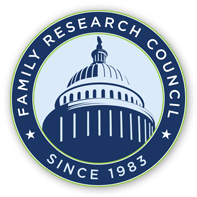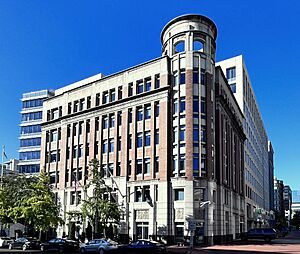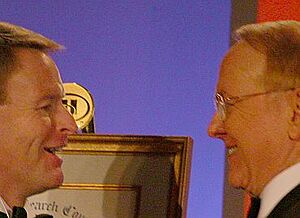Family Research Council facts for kids

Logo of Family Research Council
|
|
| Founded | 1983 |
|---|---|
| Founder | James Dobson |
| Type | 501(c)(3) non-profit organization |
| Location |
|
|
Area served
|
United States |
|
Key people
|
|
|
Revenue
|
$12,065,844 (2016 FY) |
|
Employees
|
85 |
| 2016 FY Tax Return | |
The Family Research Council (FRC) is an American evangelical non-profit group. It also works as a think-tank, which means it does research and offers ideas on public policy. FRC has an organization that works to influence laws. The FRC promotes what it believes are important family values.
The group has specific views on many topics. For example, it does not support embryonic stem-cell research or divorce. It also opposes certain LGBT rights, like anti-discrimination laws and same-sex marriage. The FRC was started in the United States in 1981 by James Dobson. It officially became a non-profit organization in 1983. Tony Perkins is its current president.
Contents
History of the FRC
The Family Research Council was officially started as a non-profit group in 1983. James Dobson was one of its founders. In 1988, the FRC joined Focus on the Family due to money problems. Gary Bauer became its president at that time.
The FRC became an independent group again in 1992. This happened because of concerns about Focus on the Family's tax status. Tony Perkins became the FRC's president in 2003.
In 2013, Josh Duggar was named the executive director of FRC Action. This is the part of the FRC that works on influencing laws. Duggar left his role in 2015.
What the FRC Believes
The Family Research Council has clear beliefs on many social and political issues. They work to promote these ideas.
Family and Social Issues
The FRC supports what it calls "family values." They believe in a one-year waiting period before married couples with children can get a divorce. This waiting period would allow them to get marriage counseling. However, this would not apply if there is domestic violence.
The FRC also supports abstinence-only sex education. This means teaching young people to wait until marriage for certain activities. They also support prayer in public schools.
The FRC does not support stem-cell research that involves destroying human embryos. They do support research using adult stem cells. They also oppose legal recognition of same-sex partnerships, like marriage or civil unions.
Health and Science Views
The FRC has opposed making the human papilloma virus (HPV) vaccine required for school. HPV is a virus that can cause cervical cancer. The FRC believes parents should have the right to decide about this vaccine. They also support their position based on their belief in abstinence before marriage.
The FRC supports a "conscience clause" for medical workers. This would allow them to refuse to provide certain treatments if it goes against their beliefs.
The Council has also questioned whether humans are mostly responsible for climate change. This view is different from what many scientists believe.
Views on Homosexuality
The FRC believes that "homosexual conduct is harmful to the persons who engage in it and to society at large." They state that it "can never be affirmed." They also say there is "no convincing evidence that a homosexual identity is ever something genetic or inborn."
The FRC also states that people who experience same-sex attractions should be helped to "overcome those attractions."
FRC's Activities

The Family Research Council is involved in many activities to promote its views. This includes publishing information and working to influence laws.
Working to Influence Laws
The FRC is part of a group called ProtectMarriage.com. This group worked to support California Proposition 8. This law aimed to limit marriage to only opposite-sex couples. It passed in 2008 but was later found to be against the law.
In 2013, the FRC shared its views with the Supreme Court. They supported Proposition 8 and the Defense of Marriage Act. This act banned the federal government from recognizing same-sex unions. However, the Supreme Court later ruled that the Defense of Marriage Act was unconstitutional.
Justice Sunday Events
Justice Sunday was a series of religious meetings organized by the FRC. These events happened in 2005 and 2006. The FRC said the goal was to stop delays in approving judges. They believed these delays were sometimes based on a judge's religious views.
Values Voter Summit
Every fall, FRC Action holds a meeting called the Values Voter Summit. This event is for conservative Christian activists and voters. It takes place in Washington, D.C.. At the summit, people can hear from Republican presidential candidates. Since 2007, a poll has been taken at the summit. This poll helps predict which candidate Christian conservatives might support.
Ugandan Resolution
In 2010, the FRC paid money to people who influence laws in Congress. This was related to a resolution about Uganda. The US House of Representatives resolution spoke against the Uganda Anti-Homosexuality Bill. This bill would have put very harsh punishments on people for certain acts.
The FRC later said they did not support the Uganda bill or harsh punishments. They said they wanted to change the language of the bill. They wanted to remove ideas that said certain acts were a "fundamental human right." In 2014, a court in Uganda ruled that the act was not valid.
Leaders of the FRC
Here is a list of the presidents who have led the Family Research Council:
- Gerald P. Regier (1984–1988)
- Gary Bauer (1988–1999)
- Kenneth L. Connor (2000–2003)
- Tony Perkins (2003–present)
See also
 In Spanish: Consejo de Investigación Familiar para niños
In Spanish: Consejo de Investigación Familiar para niños
- Christian Coalition of America
- Christian right
- Christian Voice (United States)
- LGBT rights opposition
- Moral Majority
 | Stephanie Wilson |
 | Charles Bolden |
 | Ronald McNair |
 | Frederick D. Gregory |


